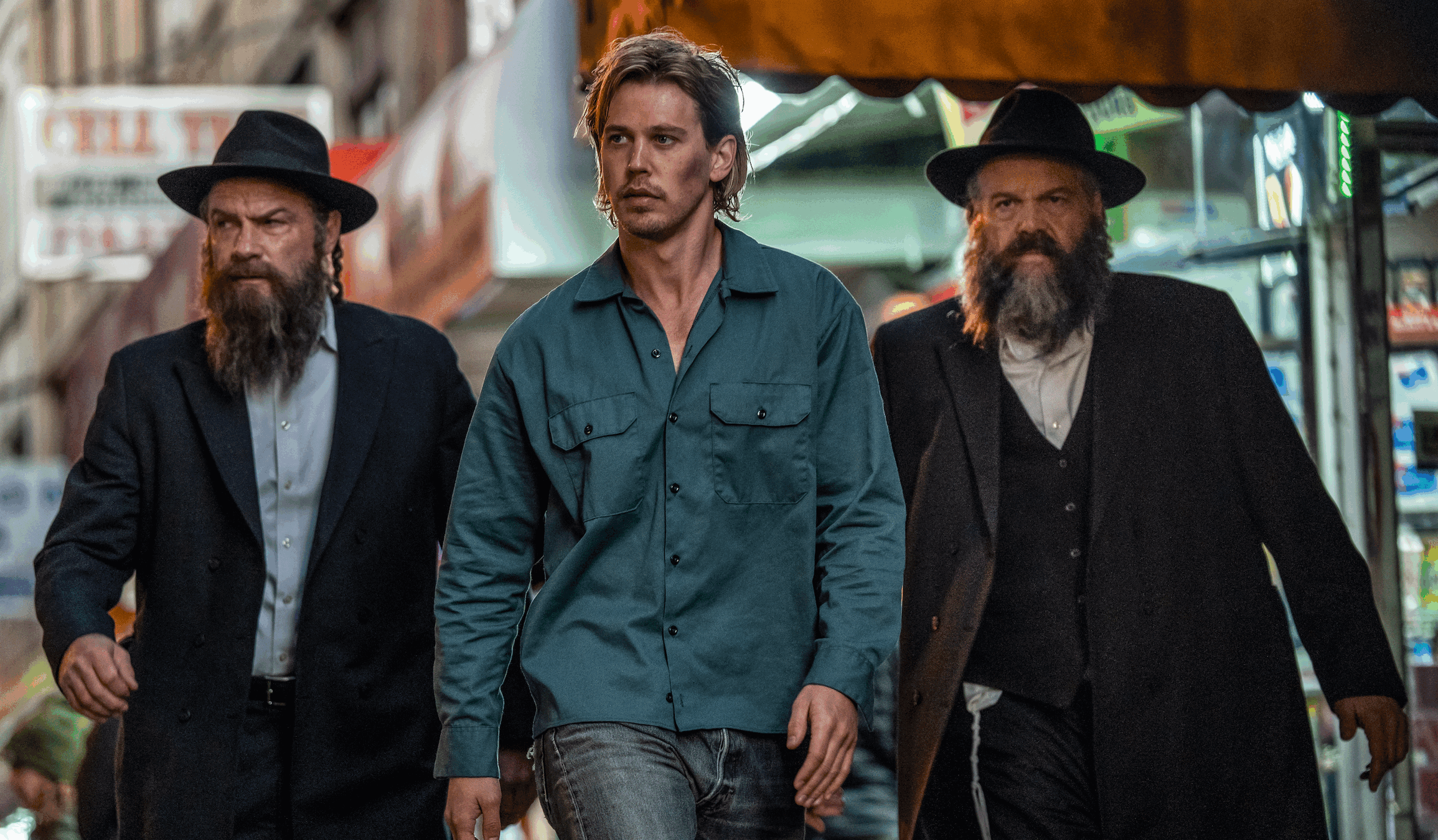Seeking gangsters, must speak Yiddish: Bringing the Hasidic underworld to life in ‘Caught Stealing’
Motl Didner coached Liev Schreiber, Vincent D’Onofrio and Carol Kane on their Yiddish scenes

Liev Schreiber, Austin Butler and Vincent D’Onofrio in Caught Stealing. Photo by Niko Tavernise
A duo of burly, gun-toting Hasidic gangsters and their doting bubbe are the breakout characters in Darren Aronofsky’s Caught Stealing — at least, for figures not of the feline variety. To bring them to life, the film had a secret weapon: a Yiddish whisperer.
Motl Didner, program director for the National Yiddish Theatre Folksbiene, first heard rumblings of the crime caper through a casting notice seeking Yiddish-speaking actors. He didn’t know the notice was for an Aronofsky film, but he passed the details along to members of the company, and even sent in a self-tape to be considered for a role.
Later, the production got in touch to use him as a Yiddish coach.
“That’s when I found out who exactly it was that I lost out to,” Didner said in a phone interview. “I don’t feel so bad about losing out to, like, Liev Schreiber.”
Didner worked with Schreiber, Vincent D’Onofrio and Carol Kane — respectively playing a pair of frightening drug lords and their grandmother — settling on a Hungarian dialect for their dialogue, and even rewriting some of their Yiddish lines. (The dynasty to which the brothers belong is never specified, but their scenes with Kane were filmed on location at a Lubavitcher household in Crown Heights, Brooklyn.)
The duo show up as a threat to the film’s protagonist, Hank (Austin Butler), who finds himself caught in the middle of their quest to recover piles of money from other ethnic gangs in 1998 New York City.
Kane, Didner said, took naturally to the mamaloshen. While she isn’t conversational in Yiddish in real life, her breakout role was as a Yiddish-speaking immigrant in Hester Street, and she more recently had Yiddish scenes in the Amazon Prime show Hunters.
Schreiber, for his part, sang Yiddish songs growing up, and “had an ear for it,” Didner said.
D’Onofrio, who isn’t Jewish, was “really kind of thrown deep into the Jewish world,” Didner said, but was very meticulous in getting his “meshugenahs” on point. Crucially, he nails the pronunciation of his beloved bubbe’s title: For native Yiddish speakers, it sounds more like “boh-beh” than “bubbie.”
Didner was on set for the scene in which Butler’s Hank slurps a bowl of matzo ball soup with the brothers. Somehow, word spread that the Oscar nominee was shooting in the neighborhood, something of a novelty for the Hasidic enclave. Evidently the heartthrob has a young Chabad fan base.
“When filming wrapped at the end of the day, there were a couple hundred teenage girls waiting to get a glimpse of Austin Butler,” Didner recalled. It was like the reception of the Beatles or, better yet, Elvis.
Didner wasn’t the only dialect coach for D’Onofrio and Schreiber; they had a separate one for English.
“Darren Aronofsky was very specific,” Didner said of “the boys” — how Aronofsky referred to the characters. “He didn’t want them to speak English with a Yiddish accent.”
Instead, they speak with Hank in a measured, yet still menacing, American aksent. It’s when they discuss how to handle him — and whether he deserves to be roughed up — that they revert to Yiddish.
There were also separate consultants, Didner said, to make sure the customs included in a bustling pre-Shabbat sequence at Bubbe’s house were authentic.
Didner saw the film over the weekend, and was happy to see diverse languages included in it.
“There’s also Spanish and Russian in there,” Didner said, adding he hopes that linguistic richness is “part of an increasing trend that people are looking for that sort of authenticity.”
Correction: A previous version of this article stated Austin Butler was an Oscar winner. He was nominated, but did not win.
















